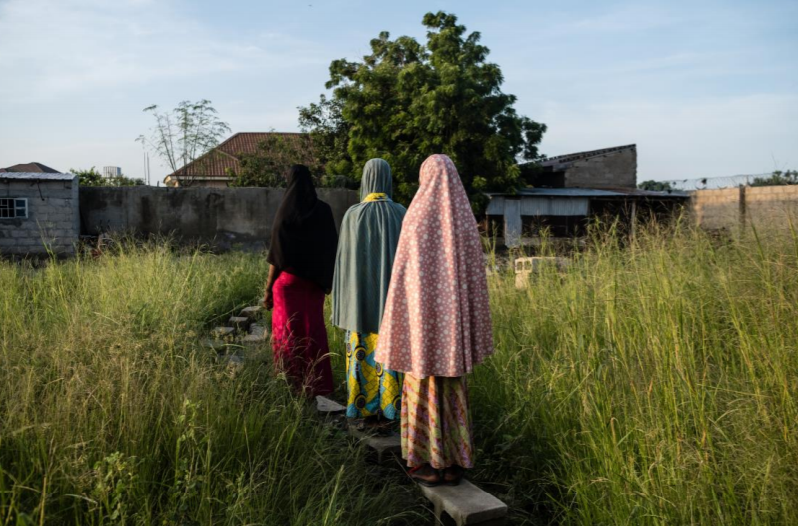Amnesty says Nigerian government has failed to protect children from Boko Haram, Army
![Displaced children unable to access education in Dalori 1 Camp outside Maiduguri, Borno State [Mohammed Abdulsamad/The Walking Paradox]](https://image.api.sportal365.com/process/smp-images-production/pulse.ng/17082024/25f9ad1c-2483-47e3-a524-b5970e77d0c5?operations=autocrop(700:467))
Amnesty International has accused the Nigerian Army of worsening the suffering of children who are victims of Boko Haram's decade-long insurgency in the northeast region.
The human rights organisation accused the military of carrying out gross violations of the rights of children from Borno and Adamawa states who faced war crimes and crimes against humanity at the hands of the terrorist group.
Boko Haram's bloody insurgency kicked off in 2009, and the sect has killed well over 30,000 people in the region and surrounding countries.
Thousands of people have also been kidnapped by the terrorists while their activities have led to the displacement of over 2.5 million people over the past decade.
The group has been notorious for using child soldiers as well as forcing abducted girls to marry fighters, or become suicide bombers.
In a 91-page report released on Wednesday, May 27, 2020, Amnesty said the Nigerian government must urgently address its failure to protect and provide education to an entire generation of children in the northeast.
The organisation said it interviewed more than 230 people, 119 of them children, who suffered serious crimes by Boko Haram, the Nigerian military, or both.
Amnesty alleged that children who escaped Boko Haram captivity faced a raft of violations by the Nigerian authorities, also including crimes under international law.
48 of the children interviewed were held in military detention for months or years, while 22 of the adults had been detained with children.
"The past decade of bitter conflict between Nigeria's military and Boko Haram has been an assault on childhood itself in Northeast Nigeria.
"The Nigerian authorities risk creating a lost generation unless they urgently address how the war has targeted and traumatised thousands of children.
"Boko Haram has repeatedly attacked schools and abducted large numbers of children as soldiers or 'wives', among other atrocities.
"The Nigerian military’s treatment of those who escape such brutality has also been appalling.
"From mass, unlawful detention in inhumane conditions, to meting out beatings and torture and allowing sexual abuse by adult inmates - it defies belief that children anywhere would be so grievously harmed by the very authorities charged with their protection," said Joanne Mariner, Acting Director of Crisis Response at Amnesty International.

Amnesty's report noted that the United Nations verified the release of 2,879 children from military detention since 2015, but that the UN's access to military detention is restricted so it cannot provide the actual number of children detained in the context of the conflict.
Most such detentions are unlawful, according to the report, as the children are never charged or prosecuted for any crime and are denied the rights to access a lawyer, appear before a judge, or communicate with their families.
"The widespread unlawful detentions may amount to a crime against humanity," Amnesty said.
The organisation also criticised Operation Safe Corridor, a military-run programme that's built to detain, deradicalise, and rehabilitate alleged Boko Haram fighters that surrender to authorities.
The programme is financially-backed by the European Union, United States, United Kingdom, and others. Even though Amnesty said many former detainees spoke positively of some aspects of the programme, it is still rife with violations that financial partners would not tolerate on their own citizens.
"None of the major donors to Safe Corridor would sanction such a system of prolonged and unlawful detention for its own citizens, so why do they do so in Nigeria?” said Osai Ojigho, Director of Amnesty International Nigeria.
Ojigho demanded that the military release all children being arbitrarily detained and halt other violations that appear aimed at punishing thousands of children, many of whom were also victims of Boko Haram's atrocities
She said the focus should be on the education and psychosocial recovery of the children, rather than dehumanising them any further.
![Aisha blows hot on Security forces; Y7ou won't believe what she said [VIDEO]](https://image.api.sportal365.com/process/smp-images-production/pulse.ng/17082024/1f976edf-1ee2-4644-8ba1-7b52359e1a8f?operations=autocrop(640:427))
)
)
)
![Lagos state Governor, Babajide Sanwo-Olu visited the Infectious Disease Hospital in Yaba where the Coronavirus index patient is being managed. [Twitter/@jidesanwoolu]](https://image.api.sportal365.com/process/smp-images-production/pulse.ng/16082024/377b73a6-190e-4c77-b687-ca4cb1ee7489?operations=autocrop(236:157))
)
)
)
)
)
)
)
)
)
)
)